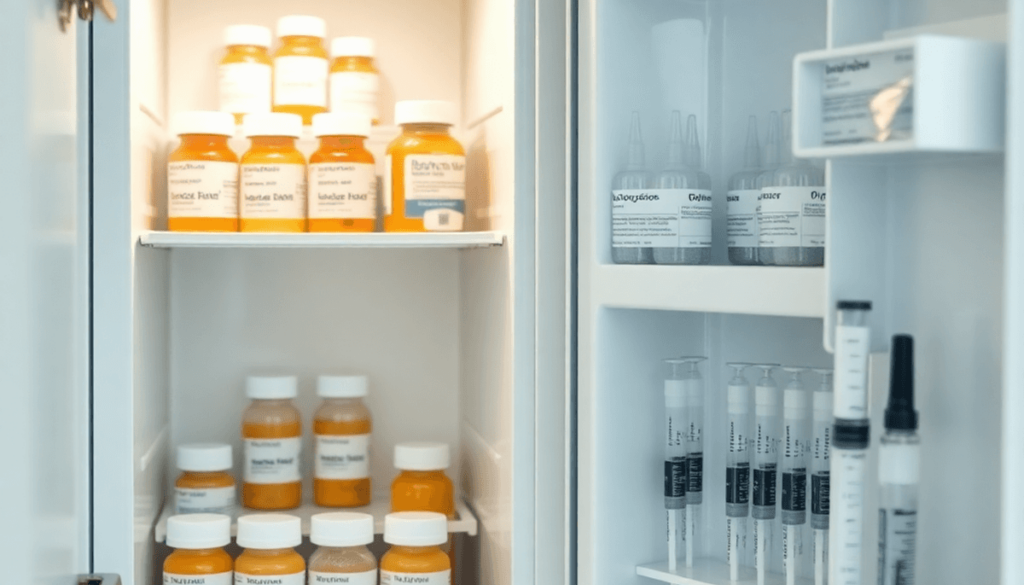A Guide to Properly Storing Injectable Medications at Home
Injectable medications are powerful tools in managing health conditions, but their effectiveness hinges on one crucial factor: proper storage at home. Stashing these meds in just any spot can lead to reduced potency or, worse, compromised safety. Think of your medication like that delicate soufflé—one wrong move with temperature or light, and the whole thing falls flat.
Improper storage doesn’t just risk wasting your prescription; it can result in medications that simply don’t work or cause unexpected side effects. For example, insulin exposed to heat may lose its ability to regulate blood sugar effectively. Vaccines and other temperature-sensitive injectables require even more precision—slipping out of recommended temperature ranges can render them useless.
This guide breaks down what you need to know about properly storing injectable medications at home. Key areas include:
- Temperature requirements for different types of injectables
- The benefits of using a dedicated medication refrigerator
- Safety measures to keep meds away from kids and pets
- Tips for traveling with injectable medications without losing their punch
- Best practices for handling injections safely
- Responsible disposal of expired or unused meds
Mastering these essentials transforms home medication storage from a guessing game into a confident routine—protecting your health and your investment every step of the way.
In addition to proper storage, understanding your medication options is equally important. For instance, if you’re exploring ADHD medication options like Vyvanse or Concerta, knowing how to store them correctly can enhance their effectiveness.
Furthermore, if you’re considering the convenience of online pharmacies for prescription delivery, it’s worth exploring what makes an online pharmacy the best in Toronto. They often provide personalized pharmaceutical care which is shaping the future of patient-centered service in healthcare.
Should you need to travel with your injectable medications, remember that there are courier and mail service options available for prescription delivery which can provide speed, safety, and convenience.
Lastly, if you ever find yourself dealing with a bladder infection or require insights on managing urinary tract infections (UTIs), it’s essential to understand the symptoms, causes, treatments, and prevention strategies for effective management.
Temperature Requirements for Injectable Medications
Storing injectable medications correctly is crucial to maintain their potency and safety. Here’s what you need to know about temperature requirements for your medications:
1. Room Temperature Storage
Most injectable medications should be stored at room temperature, ideally between 59-77°F (15-25°C). This range helps maintain the stability of the medication and ensures it remains effective when administered. For a comprehensive understanding of medication storage temperature guidelines, it’s advisable to consult reliable resources.
2. Refrigeration for Certain Medications
However, some injectable medications, such as insulin, require refrigeration to stay viable. These medications need to be kept between 2°C to 8°C (36°F to 46°F) to prevent degradation or loss of effectiveness. A detailed list of medicines requiring refrigeration can provide further insights into this aspect.
3. Risks of Temperature Extremes
Exposing medications to extreme temperatures can compromise their integrity. High temperatures can cause degradation, while freezing temperatures can damage the consistency and efficacy of refrigerated medications like insulin. It’s essential to follow the specific storage instructions provided for each medication to ensure its effectiveness. Notably, extreme temperatures may pose risks to some mail-order meds, making it crucial to monitor their storage conditions closely.
By understanding and adhering to the temperature requirements for your injectable medications, you can help guarantee their potency and safety for optimal therapeutic outcomes.
Special Considerations
For instance, B12 injections, which are often stored similarly to other injectables, have their own unique benefits and risks that one must consider before use. It’s also worth noting that your health care team plays a crucial role in managing your medication needs; having a pharmacist on your healthcare team can provide invaluable support.
Furthermore, understanding how certain medical conditions are treated with injectable medications can be beneficial. For example, if you’re a parent looking for guidance on measles prevention and treatment, this information could be critical. Additionally, emerging research suggests that genetic factors such as the MTHFR gene may influence health conditions like ADHD, further emphasizing the importance of personalized medicine.
Lastly, if you’re considering switching your prescriptions to an online pharmacy for convenience, it’s essential to know what to expect during the transfer process.
Using a Dedicated Medication Refrigerator
Injectable medications that require refrigeration deserve more than just a spot in your kitchen fridge. A medication refrigerator is not a luxury—it’s a necessity. Your regular fridge has fluctuating temperatures every time the door swings open, and those dips and spikes can degrade sensitive meds faster than you can say “needle.”
Why a Dedicated Medication Refrigerator?
- Consistent temperature control: Keeps meds snug between 2°C and 8°C without sudden changes.
- No risk of contamination: Keeps medications away from food, spills, or odors that could affect their integrity.
- Avoids accidental misuse: Reduces the chance of someone grabbing your meds thinking they’re leftovers.
Features to Look For
A good medication refrigerator should have:
- Adjustable thermostat to fine-tune the temperature precisely.
- Glass door or interior light for quick checks without opening it fully.
- Compact size that fits your space but still holds all your injectable meds comfortably.
- Alarms or alerts that warn you if the temperature wanders off course.
Temperature Monitoring Device: Your Best Friend
An external temperature monitoring device is like having a watchdog for your meds. It tracks temps continuously and can alert you via smartphone or alarm if things get too hot or cold. This peace of mind means no surprises when you reach for your injection, knowing it’s still potent and safe.
Moreover, integrating advanced technology such as pharmacy temperature monitoring systems can greatly enhance productivity and efficiency in managing medication storage.
Investing in a dedicated medication refrigerator with reliable monitoring isn’t just smart—it’s essential for keeping those injectables battle-ready.
Accessible Healthcare Support
While we’re on the topic of medication management, it’s worth noting how pharmacies are stepping up to support accessible healthcare, particularly in mental health needs. They play a crucial role in supporting mental health needs, offering vital services such as medication management and early intervention.
Online Prescription Refills and Renewals
In today’s digital age, managing prescription refills and renewals online has become increasingly convenient. If you’re unsure about how to navigate this process, there are resources available that answer frequently asked questions about prescription refills and renewals online, making it easier for you to access your medications on time.
Switching Pharmacies Smoothly
Sometimes, you might find yourself needing to switch pharmacies due to various reasons. However, this doesn’t have to disrupt your medication schedule. With the right knowledge and approach, it’s entirely possible to switch pharmacies without interrupting your medication schedule, ensuring a seamless transition in your healthcare journey.
Safety Measures for Storing Injectable Medications at Home
Injectable medications demand more than just temperature control—they require serious security. If you’ve got kids or pets roaming around, this is non-negotiable.
1. Keep meds out of reach
Store injectable meds high up or in locked cabinets. Curious little hands and paws can turn a harmless vial into a household hazard faster than you can say “ouch.”
2. Use lockable containers
Investing in lockable storage boxes designed for medications adds a solid layer of protection against unauthorized access. This isn’t just about kids; roommates, visitors, or even forgetful partners might accidentally mess with your meds.
3. Label your storage clearly
Marking containers with warnings like “For Injection Only – Keep Away from Children and Pets” helps reinforce the seriousness and keeps everyone in the loop.
4. Avoid bathroom medicine cabinets
Moisture and temperature swings make bathrooms a lousy spot for medicine storage—and they’re often accessible to kids.
5. Educate household members
Everyone should know why these meds are off-limits and what to do if they find them unattended. Providing proper patient education can help ensure everyone understands the significance of these precautions.
Injectables aren’t candy. Treat their storage with the respect it deserves to keep your home safe and your treatment effective. Furthermore, addressing common misconceptions about online prescription safety can also help in ensuring that you handle medications responsibly, whether they are injectable or not.
Traveling with Injectable Medications: Tips and Precautions
Traveling with injectable medications demands a bit of extra planning, but it’s totally doable without turning your trip into a logistical nightmare. Here’s what you need to keep in mind:
1. Pack smart
Use insulated bags for meds designed to keep your injectables within their required temperature range. These bags are lifesavers, especially for medications needing refrigeration.
2. Avoid extreme temperatures
Never stash your injectable meds in the trunk of your car or leave them exposed to direct sunlight. Hot or freezing temps can wreck their effectiveness faster than you can say “oops.”
3. Keep meds with you
Always carry your injectable medications in your carry-on bag if flying. Checked luggage gets tossed around too much, and the cargo hold’s temperature is unpredictable.
4. Use coolers for refrigerated meds
If your medication needs to stay between 2°C and 8°C (think insulin or certain biologics), pack it in a cooler with ice packs—but avoid direct contact between ice and the medication to prevent freezing damage.
5. Plan ahead
Check the weather at your destination and en route. If necessary, coordinate with your pharmacist for travel-sized storage solutions or additional advice tailored to your meds.
Remember, your injectable medications are like delicate VIPs—they need their own special treatment on the road. Treat them right, and they’ll perform just as expected when you need them most.
In addition to these tips, it’s crucial to be aware of any potential health risks during your travels. For instance, syphilis is making a comeback and understanding its symptoms and prevention methods could be vital.
Moreover, if you’re considering non-prescription solutions for weight management, ensure that these do not interfere with your injectable medications.
For parents traveling with children who require medication, it’s important to follow best practices for managing children’s medications and dosages safely.
Lastly, if you’re prone to allergies while traveling, knowing how to choose the right allergy treatment can make your journey much more comfortable.
Safe Handling Practices During Injection Preparation and Administration
Contamination prevention is crucial when handling injectable medications. Here’s what you need to know:
1. Importance of safe handling
Proper injection preparation ensures medication efficacy and reduces infection risks. It’s essential to wash hands thoroughly before handling medications to prevent contamination.
2. Preventing contamination risks
Use alcohol wipes to clean vial tops before drawing up medication. Avoid touching the needle or syringe tip to maintain sterility. Dispose of sharps properly in puncture-proof containers.
Remember, safe handling practices are essential for maintaining the integrity of injectable medications and ensuring your health and safety. However, it’s also important to be aware of the potential side effects of some long-term medications, such as those used for heartburn. For a comprehensive understanding of natural remedies and lifestyle changes that can help mitigate such issues, refer to The Ultimate Guide to Beating Heartburn Naturally in 2025.
Disposal of Expired or Unused Injectable Medications: Guidelines and Regulations
Injectable medications don’t belong in your regular trash or down the drain. Tossing them haphazardly risks environmental contamination and accidental exposure. Follow these safe disposal practices to keep your home and community safe:
- Check expiration dates regularly. Expired meds can lose potency or become harmful.
- Do not reuse or share leftover injections. Safety first—always dispose.
- Use medication take-back programs. Many pharmacies, including MisterPharmacist, offer disposal services that comply with local laws.
- Follow specific disposal instructions on labels. Some injectables require special handling.
- Seal needles and syringes in puncture-proof containers before disposal to prevent needle-stick injuries.
Local regulations vary across Toronto and Ontario, but most require that injectable medications be disposed of through authorized channels rather than household waste. Municipal hazardous waste facilities often accept sharps and medications for safe destruction.
Ignoring these rules can lead to fines or worse—contamination of water supplies or injury to sanitation workers. Keeping your injectable meds out of the wrong hands is just as important as storing them properly.
For detailed guidance tailored to your area, check with your local public health unit or pharmacy. Safe disposal is an essential chapter in A Guide to Properly Storing Injectable Medications at Home that guarantees the meds you depend on don’t turn into hazards once their job is done.
Additionally, it’s worth noting that many local independent pharmacies not only provide medication take-back programs but also offer essential services such as vaccinations. For instance, vaccinations available at your local Toronto pharmacy in 2025 will include flu and COVID-19 vaccines, ensuring you have a convenient option for staying protected as well.
Conclusion
Properly storing injectable medications at home isn’t just a nice-to-have—it’s mission critical. Stick to the right temperature ranges, whether that means room temp or refrigerated conditions, and keep meds away from light, moisture, and curious hands (kids and pets included). Handling injections safely during prep and administration keeps contamination at bay and protects your health.
Remember these key takeaways from A Guide to Properly Storing Injectable Medications at Home:
- Follow label instructions on temperature and storage conditions like your life depends on it—because it kinda does.
- Use dedicated refrigerators with reliable monitoring if refrigeration is needed.
- Secure your meds to prevent unauthorized access.
- Dispose of expired or unused medications responsibly.
Looking for a pharmacy partner who understands the importance of proper medication storage and management? MisterPharmacist, Toronto’s only 5-star Google-rated pharmacy, offers seamless transitions for all your medication needs. They not only provide same-day prescription delivery, improving access and convenience, but also offer specialized pharmacy services for seniors, ensuring they receive the care they deserve. Additionally, if you’re struggling with allergies, MisterPharmacist has got you covered with their expert advice on managing allergies with over-the-counter and prescription options. Your meds deserve nothing less than the best care possible.



